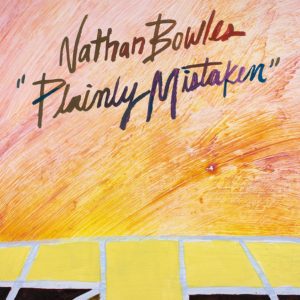The Weather Station and Jennifer Castle, two of the greatest working songwriters and poetic voices in Canada—or anywhere on this blighted, beautiful planet—have recorded a miraculous, magical pair of songs together, representing their first-ever studio collaboration and the third edition of the Polaris Collaboration Sessions.
The artists and longtime friends came together for a single day at Sugar Shack studio in London, Ontario this past August to record two songs — The Weather Station’s “I Tried to Wear the World (feat. Jennifer Castle)” and Jennifer Castle’s “Midas Touch (feat. The Weather Station),” two sides of the same tarnished gold coin of sorrowfully sweet sentiments.
-

-

-
Photo by Shervin Lainez.
-

-
Photo by Cash Honey 2018.
-

-
Photo by Shervin Lainez.
Videos shot by Colin Medley featuring in-the-studio performance footage as well as an interview featuring Castle and The Weather Station’s Tamara Lindeman will premiere worldwide on October 18.
“I’ve looked up to Jennifer for a long time, and she’s been a songwriting and singing hero of mine for probably forever,” said The Weather Station’s Lindeman. “I thought it would be cool to see inside of her process and learn something. It’s actually been really cool as we’re more similar than I thought. I see her doing things, and it all makes sense to me, and I understand her music better.”
“I came to the project via Tam, and it seemed like a really rare opportunity to go into the studio and have that resource provided for us,” said Castle. “So I think we both kind of jumped on it on that level. I just feel grateful for a day in the studio today and an opportunity to do something we wouldn’t be able to ‘afford’ to try.”
Jennifer Castle and The Weather Station are both two-time Polaris nominees. Castle’s Pink City made the Polaris Short List in 2015 while her Angels Of Death made the Long List this year. The Weather Station’s Loyalty album made the Long List in 2015 and the self-titled album made the Long List this year as well.
Outside Canada, this release inhabits the digital realm exclusively, but Polaris will release a very limited promotional 7″ for Record Store Day in Canada. Daniel Romano made the cover art.
Highlights
Tracklist
1. The Weather Station – “I Tried to Wear the World (feat. Jennifer Castle)” 2:26
2. Jennifer Castle – “Midas Touch (feat. The Weather Station)” 3:48
[date_and_catalog_section rdate=’October 18, 2018′]
Purchase from PoB above or support via
[related_albums]
Acknowledgments
Acknowledgments for The Weather Station
The new record I’m most excited about right now is by the Weather Station, a folk outfit from Toronto fronted by the singer and songwriter Tamara Lindeman. “Thirty,” the first single from “The Weather Station,” the group’s fourth record, which comes out this fall, is a song that could take a punch to the face—an urgent retelling of her thirtieth year, its triumphs, its jokes, and its failures, and how difficult it is, sometimes, to tell those things apart. Lindeman has a poet’s eye for precise, unsentimental detail (“I noticed fucking everything,” she sings, recounting a scene at a gas station), and the rigor of her narration recalls Courtney Barnett’s “Depreston,” maybe the best song ever written about ennui and real estate. “That was the year I was thirty, that was the year you were thirty-one,” Lindeman sings. How does a person suss out the proper arc of a life? She doesn’t know, either. “That was the year that we lost or we won.”
– Amanda Petrusich, The New Yorker
I’ve been a fan of The Weather Station for a while now and always quite enjoyed her albums, but this one is on another level. These songs sit in a place between thought and expression, where the music flows confidently from heart to tongue. It’s filled with feminist politics, kindred spirits, conversations and heartbreak, all well played as inspired gems. She’s lived these words. They are her being. They are her stories.
– Bob Boilen, NPR Music First Listen
Both serenity and storminess infuse the songs that Tamara Lindeman, from Toronto, writes as the Weather Station. Her band’s folk-rock is steeped in Joni Mitchell and Fairport Convention, weighing the textures of interwoven guitars; her lyrics reveal her interior monologues with a literary, lived-in sense of detail, often pondering the ways a couple’s lives can grow together and apart: “An ambulance passed on the street, and you took my arm reflexively,” she sings in “Thirty.”
– Jon Pareles, The New York Times
8.0 From front-to-back, this is the first The Weather Station album that sounds as fleshed-out and powerful as the world it contains. It’s a balancing act that can swerve in a heartbeat from romantic comedy to psychological horror.
– Sam Sodomsky, Pitchfork
9/10. Lindeman could never pass unrecognized. No one else is writing true-life songs with such a command of nuance and ellipsis, with such generosity of unguarded emotion and careful economy of means, like Sam Shepard writing haiku.
– Richard Williams, Uncut
Acknowledgments for Jennifer Castle
#1, Real Life Rock Top Ten. You might bet against the notion of anyone other than Lana Del Rey calling an album Angels of Death and not drowning in her own pretentiousness. With the Toronto singer Castle, you’d lose. The first song is last night’s dream you can’t remember; Castle remembers it for you, and as the songs roll on she stays on that path. The action is all in the interstices between the melody and the cadence, the voice and the instrumentation. The melody seems called up by the cadence, the instrumentation feels like a reflection of the voice, and you can find yourself listening for those tiny lifts, the suspensions in the songs replacing the songs themselves.
– Greil Marcus, Village Voice
She’s never been more potent than on her new album, Angels of Death, a work that may well stand the test of time as a masterpiece. Like some sacred text, it is a scriptural paean to the loved ones lost and the indelible mark they’ve left on our lives. It mourns and it celebrates, embracing the transformation of time, eternal constellation of growth and decay and growth again. These deeply difficult and existential musings find Castle at the height of her artistic powers, both sonically and lyrically.
– Chad Depasquale, Aquarium Drunkard
No hyperbole, Jennifer Castle is a spectacular songwriter. Castle’s singing carries the joy of life. It’s what helps keep the artist perched on the vanguard of celestial country and fantastical folk, a title she affirms once again with her fifth album Angels of Death.
– The FADER
8/10. Fine-boned, effortless. Despite its gloomily foreboding title, Castle’s new country-soul/folk set is light, lean, and possesses a dulcet luminosity. With an empathetic band featuring strings, keys, and pedal steel, Castle alternately pulls the songs into focus with her clear, honeyed voice and lets it drift free inside them.
– Sharon O’Connell, Uncut
Angels of Death exhumes death’s many forms with tenderness, narrating the often inarticulate core of grief—from pain and emptiness to the memories and hovering apparitions. Themes of loss, confusion, and frustration meet burning country and gospel-inspired anthems and sparse, piano-driven ballads. Throughout, she effortlessly conveys the conflicting emotions that accompany loss.
– Erin Osmon, Pitchfork











